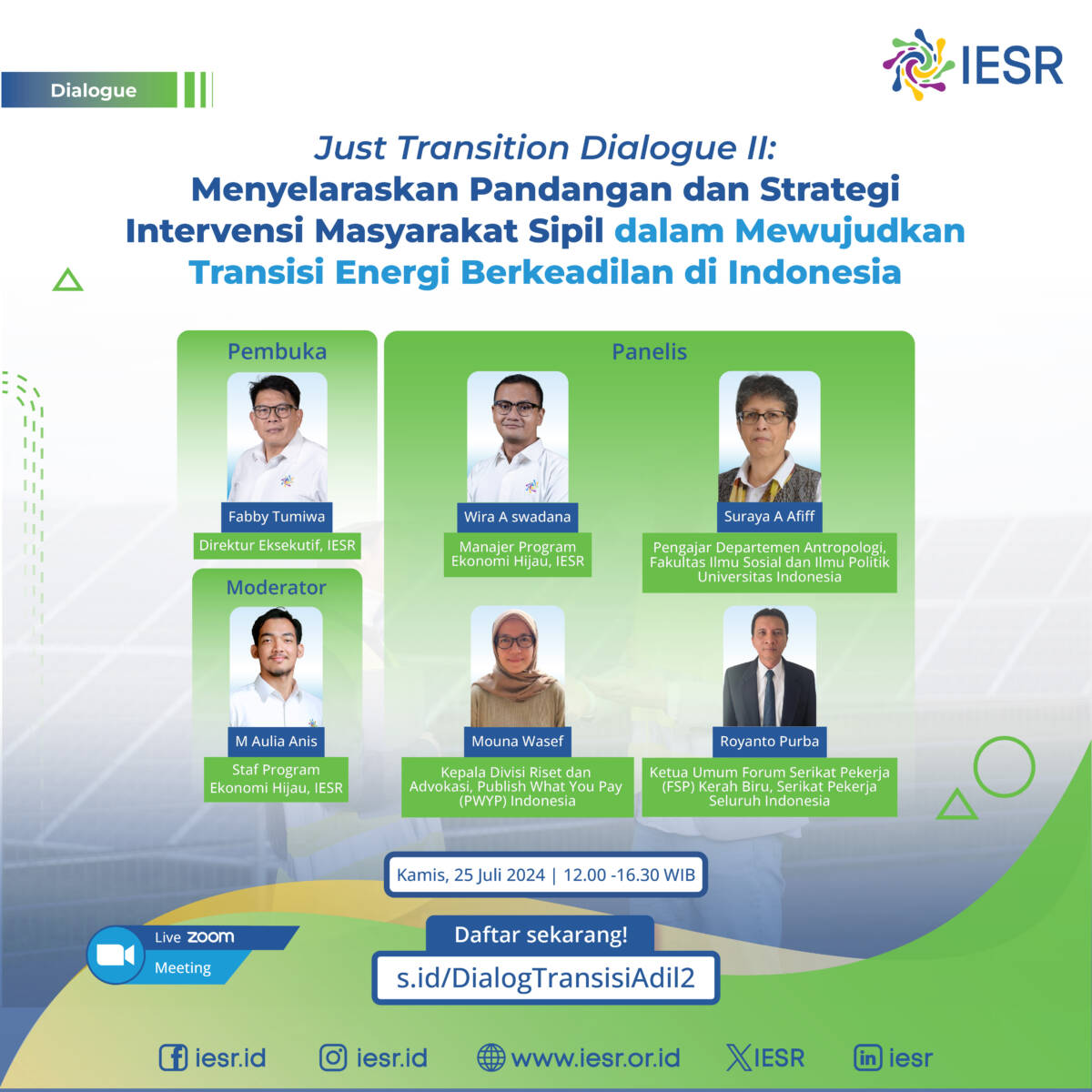
Just Transition Dialogue II: Aligning Civil Society’s Views and Intervention Strategies in Realizing a Just Energy Transition in Indonesia
Background
Currently, the Indonesian government is drafting the National Medium-Term Development Plan (RPJMN), which is a derivative of the National Long-Term Development Plan (RPJPN) 2025-2045. The document will also be adjusted to the vision and mission of the elected president and vice president for the period 2024-2029. In the latest draft, Indonesia’s energy transition policy is to support carbon neutral by 2050 through several priority sectors such as renewable energy development, electricity grids, and environmentally friendly transportation (Ministry of National Development Planning/Bappenas, 2023). However, the current energy transition policy direction still focuses on technical aspects, while the socio-economic dimensions of the energy transition have not been discussed in depth. In fact, this is very crucial in ensuring that the energy transition process can run in an equitable manner.
The term ‘equitable transition’ actually first emerged as a concept in the labor sector during the 1970s (Wang & Lo, 2021). Meanwhile, the discourse on the concept of equitable transition extends to the context of climate change. This is because the impacts of climate change extend to various elements of people’s lives, including employment and community resilience (LSE, 2024). The International Labor Organization (ILO) estimates, for example, that around 1.2 billion jobs depend on environmental sustainability. Meanwhile, global warming is expected to result in the loss of 80 million jobs (ILO, 2023). As a transformational effort in mitigating the impacts of climate change, the energy transition has the potential for widespread impacts, not only on the energy sector, but also on the socio-economic aspects of a region. For example, a decrease in employment and regional income. Therefore, the transition from fossil energy to renewable energy must ensure easy access to energy while minimizing the social, economic and environmental impacts that may occur. In the Indonesian context, the transition to low-carbon energy must also be done comprehensively and according to the context in each location.
Many countries with high dependence on fossil fuels have long applied elements of equity in the energy transition. Germany, as one of the countries that started to enjoy the benefits of a just transition, has implemented a policy of economic diversification due to the massive decline in coal prices in 1967. The increase in unemployment is one of the main issues of concern, so the government took policies related to job training programs. In general, the multisectoral policy mix that Germany has implemented for almost five decades is oriented towards; 1) economic diversification, 2) employment support, 3) social protection, and 4) environmental remediation and protection (Furnaro et al., 2021).
In addition, Canada is also an example of a country that has a strong commitment to the elimination of coal use in its electricity system and created an equitable transition commission for workers in the coal sector in 2018. This strategy also coincides with the Government of Canada’s funding commitment of CAD 185 million, consisting of CAD 35 million to support coal worker skills development and economic diversification, and CAD 150 million for infrastructure development. In addition, the Government of Canada has also set aside a special fund from profits from oil and gas sales to accelerate the energy transition (IEA, 2023). Therefore, strong commitment and long-term policy planning have been key to Canada’s implementation of the equitable transition to date.
Looking at the examples of the two countries above, the momentum of the preparation of Indonesia’s national development planning documents is important to ensure that the planned energy transition programs can run fairly and sustainably. Given the multisectoral concept of equitable transition, the Government of Indonesia together with related parties needs to conceptualize equitable transition for the energy transition agenda in planning and implementing national energy transition programs. Furthermore, the government also needs to integrate government programs, both existing and newly planned, within the framework of an equitable energy transition. Thus, it is expected that the planned energy transition programs will be implemented in an equitable manner by taking into account location-specific social, economic and environmental impacts.
Objective
- To gather inputs and views from various civil society organizations (CSOs) and think-tanks, related to the principles and criteria/indicators of Equitable Transition in the Indonesian context.
- To gather and harmonize CSO intervention strategies on the issue of Equitable Transition in Indonesia.
Presentation
Draft Definition and Scope of an Equitable Transition in Indonesia – Wira A Swadana
Rancangan-Definisi-dan-Cakupan-Transisi-Berkeadilan-di-Indonesia-Wira-A-SwadanaJust Energy Transition – Dr Suraya A
Transisi-Energi-Berkeadilan-Dr-Suraya-AAspects of Gender Equality, Disability and Social Inclusion (GEDSI) in the Just Energy Transition – Mouna Wasef
Aspek-Kesetaraan-Gender-Disabilitas-dan-Inklusi-Sosial-GEDSI-dalam-Transisi-Energi-Berkeadilan-Mouna-WasefAspects of Employment in a Just Transition – Royanto Purba
Aspek-Ketenagakerjaan-dalam-Transisi-Berkeadilan-Royanto-PurbaSpeakers
-
Fabby Tumiwa - Chief Executive Officer (CEO) - IESR
-
Wira A. Swadana - Program Manager Ekonomi Hijau - IESR
-
Muhammad Aulia A - Staf Program Ekonomi Hijau - IESR
-
Royanto Purba - Ketum Federasi Serikat Pekerja Kerah Biru - SPSI
-
Suraya Abdulwahab Afif Ph.D - Pengajar Departemen Antropologi - Fakultas Ilmu Sosial dan Ilmu Politik Universitas Indonesia
-
Mouna Wasef - Kepala Divisi Riset dan Advokasi Publish What You Pay (PWYP) Indonesia

